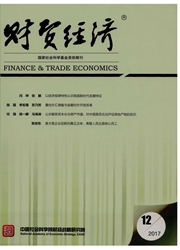

 中文摘要:
中文摘要:
本文针对“主发起行制度”下,村镇银行大股东初始持股比例的现实差异和既有研究不足,基于公司治理理论和博弈分析思路,引入拓展的纳什谈判模型,从谈判优势和控制权收益相结合的视角,构建解释大股东初始持股比例形成机制的理论模型,进而运用中国865家村镇银行的数据,实证检验理论模型推论与假说发现:村镇银行创立阶段,大股东具有利用谈判优势,提高初始持股比例的倾向;控制权收益增加,对其具有抑制作用,且大股东谈判优势越强,这种抑制作用越明显,但并不会改变大股东追求较高初始持股比例的基本趋势。然而,从村镇银行发展角度出发,大股东应降低初始持股比例,尤其是在控制权收益较高、谈判优势较低情况下,更应如此,至少不应超出其所拥有的谈判优势。本文不仅直接支持了调低村镇银行大股东初始持股比例的政策,提出了完善我国村镇银行股权结构的对策建议,而且创新了公司股权结构形成机制研究视角,完善和深化了既有研究。
 英文摘要:
英文摘要:
Based on the theory of corporate governance and the analysis of game theory, this paper introduces the extended Nash negotiation model, from the negotiation advantage and the control benefit, analyzing the differences between the initial holding proportion of the substantial shareholder and the existing research. And then use the data of China's 865 villages and towns banks to test the theory model and the hypothesis. It found that at the creation stage of the village bank the substantial shareholder has the advantage of using negotiations, the substantial shareholders are prone to increase the proportion of initial ownership. The increase of control income has the inhibitory effect on it, and the stronger the dominant shareholder's negotiation advantage is, the more obvious this inhibitory effect is, but it does not change the basic shareholder's pursuit of higher initial shareholding proportion trend. However, from the perspective of the development of village banks, substantial shareholders should reduce the proportion of initial holdings, especially in the case of higher control benefits and lower negotiating advantages, at least should not exceed their negotiating advantages. The article not only directly supports the policy of reducing the initial proportion of the substantial shareholder of the rural hank, hut also puts forward the suggestions to perfect the equity structure of the rural bank. And it also innovates the research of the formation mechanism of the stock ownership structure of the company and perfects and deepens the existing research.
 同期刊论文项目
同期刊论文项目
 同项目期刊论文
同项目期刊论文
 期刊信息
期刊信息
